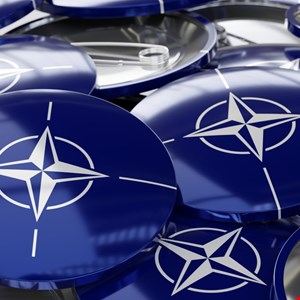- I upgraded to Android 16 - here's what I love and what's still missing
- You can get a free Samsung Galaxy S25 Plus from T-Mobile - how to qualify for the deal
- I replaced my Pixel 9 Pro for this $750 Android phone - and didn't regret it
- This is the most travel-friendly charger I've tested, with support for over 190 countries
- Grab this 230-piece Craftsman tool set for 50% off at Amazon
NATO Set to Build New Cyber Defense Center

NATO’s members have agreed to the construction of a new cyber-defense facility designed to help the military alliance build resilience and better respond to digital threats.
As the alliance celebrated its 75th anniversary with a summit in Washington DC from 9 to 11 July, it revealed plans for a new NATO Integrated Cyber Defence Centre (NICC), to be based at the Supreme Headquarters Allied Powers Europe (SHAPE) in Belgium.
The center will comprise civilian and military experts from across member states, and feature advanced technology designed to enhance situational awareness and boost collective cyber-resilience and defense, NATO said.
The details will be thrashed out over the coming months, with NICC’s main role to inform NATO’s military commanders about offense cyber-threats and vulnerabilities which could impact the alliance, including privately owned civilian critical infrastructure.
Read more on NATO: Hackers Target New NATO Member Sweden with Surge of DDoS Attacks.
Since officially declaring cyberspace a legitimate domain for war several years ago, NATO has been enhancing its capabilities in the space.
It regularly conducts cyber-defense exercises, involving non-NATO members like Japan and South Korea, and in 2022 announced plans to develop rapid response capabilities “to respond to significant malicious cyber activities.”
Also that year, NATO successfully completed a trial of new “quantum safe” technology, designed to mitigate the future risks posed by quantum computers cracking asymmetric cryptography.
Activities like these and the NICC are being executed against a backdrop of growing concern about the possibility of a Trump presidency undermining the alliance, as well a response to increasingly aggressive moves by Russia, China and other hostile states.
In October 2023, Microsoft warned that Chinese actors had pre-positioned themselves into critical infrastructure networks, with a view to potentially launching destructive attacks in the event of a conflict.
Russia regularly conducts cyber-espionage campaigns against the alliance, and has tried to use false narratives to undermine it in various countries. The Kremlin still asserts that NATO ‘aggression’ was the reason for its invasion of Ukraine.
The NICC will be able to draw on the expertise of new members Sweden and Finland.

